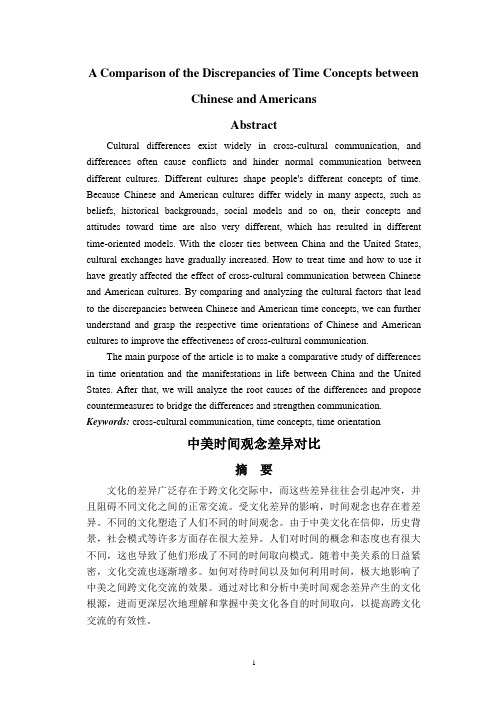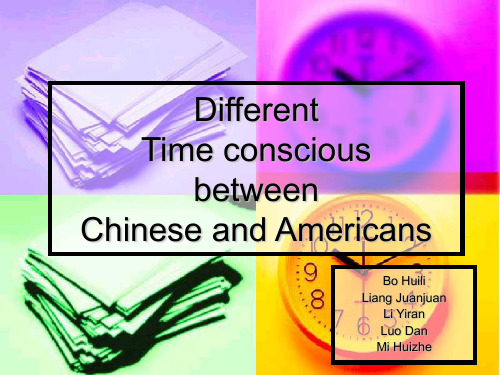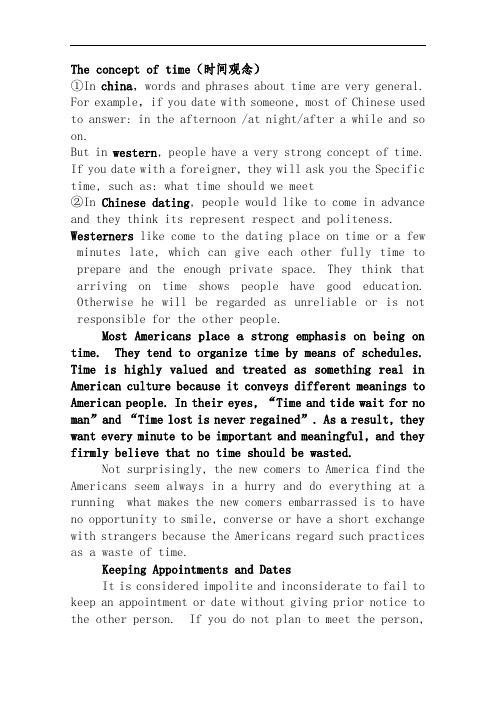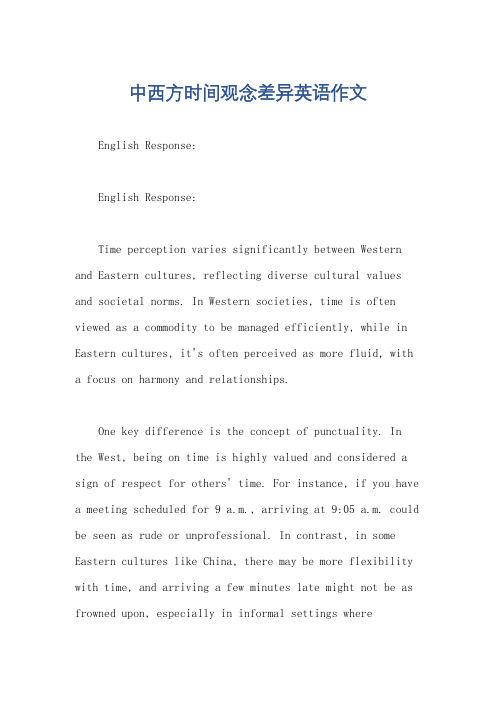中西方时间观念差异_英文
Different attitudes to time中西方时间观念比较

While Americans are used to Monochromic-Time
Americans prefer to do one things at a time
Causing the cultural differences
• Asians use time more freely and flexibly, preferring to hanging the wording of uncertainty on the lips, such as "immediately“, "sometimes", "most of the day," “in a while", which makes Westerners puzzle. • In Western society where time is almost a commodity, it is real and valuable, which can be traded, saved, wasted, lost, borrowed and measured. • "Time is money" seems to have become the credo of Western life.
M e e ting
In business meeting, 5 minutes late is OK in American. While in west culture, waiting is a waste of time. Americans have no tolerance to waiting too long. And the time spent in waiting may contain some massage. If some one want to be successful, he or she will not make others to wait. In China, if one is going to be late, no one will know how much time he or she will be late. In China, people are willing to wait. They believe that waiting can maintain good relationship. The time they spent on waiting may not contain much massage.
中西方时间观念差异英文

中西方时间观念差异英文Document serial number【UU89WT-UU98YT-UU8CB-UUUT-UUT108】Compared with America being slaves to nothing but theclock .Chinese care a little about time going by .The concept of time(时间观念)①In china,words and phrases about time are very general. For example,if you date with someone, most of Chinese used to answer: in the afternoon /at night/after a while and so on.But in western, people have a very strong concept of time. If you date with a foreigner, they will ask you the Specific time, such as: what time should we meet②In Chinese dating, people would like to come in advance andthey think its represent respect and politeness.Westerners like come to the dating place on time or a few minutes late, which can give each other fully time to prepare and the enough private space. They think that arriving on time shows people have good education. Otherwise he will be regarded as unreliable or is not responsible for the other people.Most Americans place a strong emphasis on being ontime.?They tend to organize time by means of schedules. Time is highly valued and treated as something real in American culture because it conveys different meanings to American people. Intheir eyes, “Time and tide wait for no man”and “Time lost is never regained”. As a result, they want every minute to be important and meaningful, and they firmly believe that no time should be wasted.Not surprisingly, the new comers to America find the Americans seem always in a hurry and do everything at a running what makes the new comers embarrassed is to have no opportunityto smile, converse or have a short exchange with strangers because the Americans regard such practices as a waste of time.Keeping Appointments and DatesIt is considered impolite and inconsiderate to fail to keep an appointment or date without giving prior notice to the other person.?If you do not plan to meet the person, then you should decline the invitation.。
中美时间观念差异对比(商务英语专业)

A Comparison of the Discrepancies of Time Concepts betweenChinese and AmericansAbstractCultural differences exist widely in cross-cultural communication, and differences often cause conflicts and hinder normal communication between different cultures. Different cultures shape people's different concepts of time. Because Chinese and American cultures differ widely in many aspects, such as beliefs, historical backgrounds, social models and so on, their concepts and attitudes toward time are also very different, which has resulted in different time-oriented models. With the closer ties between China and the United States, cultural exchanges have gradually increased. How to treat time and how to use it have greatly affected the effect of cross-cultural communication between Chinese and American cultures. By comparing and analyzing the cultural factors that lead to the discrepancies between Chinese and American time concepts, we can further understand and grasp the respective time orientations of Chinese and American cultures to improve the effectiveness of cross-cultural communication.The main purpose of the article is to make a comparative study of differences in time orientation and the manifestations in life between China and the United States. After that, we will analyze the root causes of the differences and propose countermeasures to bridge the differences and strengthen communication. Keywords: cross-cultural communication, time concepts, time orientation中美时间观念差异对比摘要文化的差异广泛存在于跨文化交际中,而这些差异往往会引起冲突,并且阻碍不同文化之间的正常交流。
中美文化时间观念的差异

Eating Habits Chinese: use chopsticks not pay the bill American: use knife and folk fast food pay the bill
Tea Culture
Chinese: drink tea at any time of the day at home or in
Different Time conscious between Chinese and Americans
Bo Huili Liang Juanjuan Li Yiran Luo Dan Mi Huizhe
Different behavior about Chine阴一寸金, 寸金难买寸光阴。
Time flies!
子在川上曰:“逝者如斯乎!不 舍昼夜。”
Time heals all wounds.
人生天地之间,若白驹过隙,忽 然而已。
Time is like the water suck in sponge: if you squeeze, you can always get some.
tea house prefer there tea plain with nothing else in it
American:
drink tea mostly for breakfast or after meal
use tea bags to make their tea
Different Behavior
Because of
Different Culture
Features of a man in American Culture
中西方时间观念差异-英文

The concept of time(时间观念)①In china,words and phrases about time are very general. For example,if you date with someone, most of Chinese used to answer: in the afternoon /at night/after a while and so on.But in western, people have a very strong concept of time. If you date with a foreigner, they will ask you the Specific time, such as: what time should we meet②In Chinese dating, people would like to come in advance and they think its represent respect and politeness. Westerners like come to the dating place on time or a few minutes late, which can give each other fully time to prepare and the enough private space. They think that arriving on time shows people have good education. Otherwise he will be regarded as unreliable or is not responsible for the other people.Most Americans place a strong emphasis on being on time. They tend to organize time by means of schedules. Time is highly valued and treated as something real in American culture because it conveys different meanings to American people. In the ir eyes, “Time and tide wait for no man”and “Time lost is never regained”. As a result, they want every minute to be important and meaningful, and they firmly believe that no time should be wasted.Not surprisingly, the new comers to America find the Americans seem always in a hurry and do everything at a running what makes the new comers embarrassed is to have no opportunity to smile, converse or have a short exchange with strangers because the Americans regard such practices as a waste of time.Keeping Appointments and DatesIt is considered impolite and inconsiderate to fail to keep an appointment or date without giving prior notice to the other person. If you do not plan to meet the person,then you should decline the invitation.。
中西方时间观念差异英语作文

中西方时间观念差异英语作文English Response:English Response:Time perception varies significantly between Western and Eastern cultures, reflecting diverse cultural values and societal norms. In Western societies, time is often viewed as a commodity to be managed efficiently, while in Eastern cultures, it's often perceived as more fluid, with a focus on harmony and relationships.One key difference is the concept of punctuality. In the West, being on time is highly valued and considered a sign of respect for others' time. For instance, if you have a meeting scheduled for 9 a.m., arriving at 9:05 a.m. could be seen as rude or unprofessional. In contrast, in some Eastern cultures like China, there may be more flexibility with time, and arriving a few minutes late might not be as frowned upon, especially in informal settings wherepersonal relationships matter more than strict adherence to schedules.Another aspect is the pace of life. Western societies often prioritize efficiency and productivity, leading to a fast-paced lifestyle where people are constantly busy and multitasking. Phrases like "time is money" emphasize the importance of using time wisely to achieve success. On the other hand, Eastern cultures may value a slower pace of life, allowing time for contemplation, leisure, and connection with others. In Japan, for example, the concept of "Ma" refers to the interval between events, emphasizing the beauty of pauses and silence in enhancing experiences.Furthermore, attitudes towards the future also differ. Western cultures tend to have a future-oriented mindset, where planning and goal-setting are highly emphasized. People are encouraged to think ahead, set long-term objectives, and work towards achieving them systematically. In contrast, some Eastern cultures, such as those influenced by Confucianism, may prioritize the present moment and place greater importance on maintaining harmonyin interpersonal relationships. This can be seen in phrases like "活在当下" (live in the moment) in Chinese culture, emphasizing the significance of cherishing the present instead of constantly worrying about the future.In conclusion, while both Western and Eastern cultures have their own unique perspectives on time, understanding and respecting these differences can facilitate effective communication and collaboration in today's globalized world.中文回答:时间观念在西方和东方文化中存在显著差异,反映了不同的文化价值观和社会规范。
中美时间安排区别英文作文
中美时间安排区别英文作文英文:In comparing the time arrangements between China and the United States, there are several notable differences that impact daily life, work, and communication. These disparities arise from cultural, historical, and practical factors shaping each country's approach to time management.Firstly, one significant contrast lies in the perception and utilization of punctuality. In the United States, punctuality is highly valued, and being late is generally considered disrespectful and unprofessional. Meetings, appointments, and social gatherings often start promptly at the scheduled time, and arriving even a few minutes late may be frowned upon. For instance, if a colleague schedules a meeting for 9 a.m., it is expected that all participants arrive a few minutes early to prepare and start on time.In China, while punctuality is still important in many contexts, there is often more flexibility regarding time arrangements. Social gatherings, for example, may have a designated start time, but it is common for attendees to arrive gradually over an extended period. This relaxed attitude towards punctuality is often influenced by the concept of "中国时间" (zhōngguó shíjiān), loosely translated as "Chinese time," which suggests a more fluid interpretation of schedules.Another notable difference is the structure of the typical workday. In the United States, the standard workweek typically consists of five days, from Monday to Friday, with weekends off. Office hours typically start around 9 a.m. and end around 5 p.m., although this can vary depending on the industry and individual workplace policies. Additionally, there is a strong emphasis on work-life balance, with many companies offering flexible work arrangements and paid time off for vacations and personal matters.On the other hand, in China, the workweek traditionallyspans from Monday to Saturday, with Sunday designated as the primary day off. Office hours may also vary but generally extend later into the evening compared to the United States, with it being common for employees to work beyond the standard 9-to-5 schedule. However, like in the U.S., there is a growing awareness of the importance of work-life balance, and some companies are adopting more flexible policies to accommodate employees' personal needs.Communication styles also differ between the two countries, which can influence time arrangements. In the United States, direct and straightforward communication is often preferred, with individuals valuing concise and efficient exchanges. This can manifest in the way meetings are conducted, with agendas outlined in advance, and discussions kept on track to ensure time is used efficiently.In China, communication tends to be more indirect, with an emphasis on maintaining harmony and saving face. This can sometimes lead to longer discussions and decisions taking more time to reach consensus. As a result, meetingsand negotiations may require more patience and flexibility regarding time management.Overall, while both China and the United States prioritize effective time management, there are distinct differences in how time is perceived, scheduled, and utilized in various aspects of daily life, work, and communication.中文:在比较中美两国的时间安排时,有几个显著的差异影响着日常生活、工作和沟通。
(英文汇报)时间观念东西方文化差异
Abandon national center -cultural ideas
Respect for cultural differences and reducing communication barriers.
Do you love life? Then do not waste time, for that is the stuff life is made of.
—Benjamin Franklin
They see time as a valuable resource. Maybe that's why they are fond of the expression, "Time is money."
“Time is most brisk and giddy-paced.”
(敏锐的)
(眼花缭乱的)
— Shakespeare
日月光华,旦复旦兮。 ——《尚书大传》上卷
The sun alternates with the moon; Days come one after another soon.
cases
Time for Chinese is more flexible and more human-centered. For example:
They usually schedule several activities at the same time They usually put interpersonal relations above the schedule The big shot usually is late
英文汇报时间观念东西方文化差异
WEST
pocket planners
time tables
on time
appointments agendas
in time
deadlines time managements
plans
schedules
accountings
calendar s
American lifestyles show how much people respect the time of others. When people plan an event, they often set the time days or weeks in advance. Once the time is fixed, it takes almost an emergency to change it. If people want to come to your house for a friendly visit, they will usually call first to make sure it is convenient.
The Chinese nation’s concept of time is rooted in the culture of farming time; time has a close relation with the nature. Time is really fleeting, but it also circle like the constantly changing of four seasons, and the sun and the moon cycle alternately, it will come back soon; so people usually think that the lost time could be back. This kind of view of time shaped people a sense that time is rich, and also nurtured a habit of leisure and slow living habit.
中西方时间观念差异-英文教学提纲
中西方时间观念差异-英文精品文档Compared with America being slaves to nothing but the clock .Chinese care a little about time going by .The concept of time(时间观念)①In china,words and phrases about time are very general. For example,if you date with someone, most of Chinese used to answer: in the afternoon /at night/after a while and so on.But in western, people have a very strong concept of time. If you date with a foreigner, they will ask you the Specific time, such as: what time should we meet?②In Chinese dating, people would like to come in advance and they think its represent respect and politeness.Westerners like come to the dating place on time or a few minutes late, which can give each other fully time to prepare and the enough private space. They think that arriving on time shows people have good education. Otherwise he will be regarded as unreliable or is not responsible for the other people.Most Americans place a strong emphasis on being on time. They tend to organize time by means of schedules. Time is highly valued and treated as something real in American culture because it conveys different meanings to American people. In their eyes, “Time and tide wait for no man”and “Time lost is never regained”. As a result, they want every minute to be important and meaningful, and they firmly believe that no time should be wasted.Not surprisingly, the new comers to America find the Americans seem always in a hurry and do everything at a running pace.So what makes the new comers embarrassed is to have no opportunity to smile, converse or have a short exchange with strangers because the Americans regard such practices as a waste of time.Keeping Appointments and DatesIt is considered impolite and inconsiderate to fail to keep an appointment or date without giving prior notice to the other person. If you do not plan to meet the person, then you should decline the invitation.收集于网络,如有侵权请联系管理员删除。
- 1、下载文档前请自行甄别文档内容的完整性,平台不提供额外的编辑、内容补充、找答案等附加服务。
- 2、"仅部分预览"的文档,不可在线预览部分如存在完整性等问题,可反馈申请退款(可完整预览的文档不适用该条件!)。
- 3、如文档侵犯您的权益,请联系客服反馈,我们会尽快为您处理(人工客服工作时间:9:00-18:30)。
Compared with America being slaves to nothing but the clock .Chinese care a little about time going by .
The concept of time(时间观念)
①In china,words and phrases about time are very general. For example,if you date with someone, most of Chinese used to answer: in the afternoon /at night/after a while and so on.
But in western, people have a very strong concept of time. If you date with a foreigner, they will ask you the Specific time, such as: what time should we meet
②In Chinese dating, people would like to come in advance and they think its represent respect and politeness.
Westerners like come to the dating place on time or a few minutes late, which can give each other fully time to prepare and the enough private space. They think that arriving on time shows people have good education. Otherwise he will be regarded as unreliable or is not responsible for the other people.
Most Americans place a strong emphasis on being on time.?They tend to organize time by means of schedules. Time is highly valued and treated as something real in American culture because it conveys different meanings to American people. In their eyes, “Time and tide wait for no man”and “Time lost is never regained”. As a result, they want every minute to be important and meaningful, and they firmly believe that no time should be wasted.
Not surprisingly, the new comers to America find the Americans seem always in a hurry and do everything at a running pace.So what makes the new comers embarrassed is to have no opportunity to smile, converse or have a short exchange with strangers because the Americans regard such practices as a waste of time.
Keeping Appointments and Dates
It is considered impolite and inconsiderate to fail to keep an appointment or date without giving prior notice to the other person.?If you do not plan to meet the person, then you should decline the invitation.。
